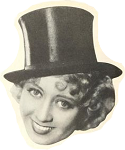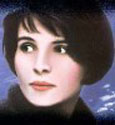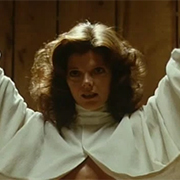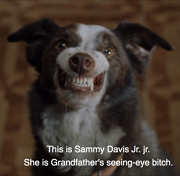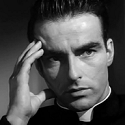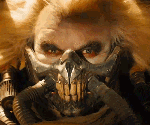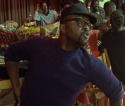|
Keanu Grieves posted:Except for a placenta bath as a substitute for any real gore. Seriously, there's, like, very little blood in that movie and yet Lynne Ramsay still finds a way to paint with a disturbingly red palette. I thought the film was total faux-brow. I hated it.
|
|
|
|

|
| # ? May 22, 2024 10:22 |
|
I've seen The Shawshank Redemption more times than I can count, but I'm drawing a blank at the moment with this question. Which scene was the song "Lovesick Blues" played on?
|
|
|
|
I think one of the inmates listens to it in the library on headphones and gets yelled at by Andy for singing along loudly
|
|
|
|
Ahh, that's right. It was Heywood (William Sadler) enjoying the new record collection.
|
|
|
|
Magic Hate Ball posted:Is Jane Campion's career worth pursuing after The Piano? Everything I love about her early work seems to vanish around that point (the hands-on style, the textured feel of New Zealand, the weird, aggressive whimsy). Even Bright Star looks like it was directed by someone else. I like Holy Smoke which just goes balls out crazy at points, but, yeah, Bright Star is just turgid.
|
|
|
|
Are there any good Hammer Film and Universal Monster box sets or collections? I'm more interested in extras than the actual movies, most of which I have on VHS.
|
|
|
|
I watched Mulholland Drive for the first time yesterday. I feel like I got most of it, but I'd still like to look over a good reading of it if anyone has one handy, or has written one in the past. Essentially, what I got was that Diane went to Hollywood with her aunt's money, wasn't selected for the lead role and projected a whole backstory on to Camilla to explain why she didn't get it. They may or may not have had some kind of relationship, I took it that they might have had a fling and her jealousy over Camilla and the director pushed her over the edge. Then she killed herself over guilt and the whole bit up until the Silencio scene was her wish fulfillment fantasy, placing herself as the innocent 'Betty' and having Camilla/'Rita' as dependent on her rather than the other way around. Is that roughly on the money or am I way off? A few things I didn't get the significance of though: 1. The blue box - I understand the key, but was the box 'unlocking' the real memories? 2. The strange man in the alley and the nightmare that the man had earlier about him. Was this a manifestation of Diane's guilt or something else? 3. The cowboy. Was he just one of Lynch's odd characters that was placed there to spice things up or did he have a deeper meaning? Did Diane just place him into her backstory as she saw him at the party near the end? Very good movie, just trying to make head and tails of a lot of it.
|
|
|
|
PTizzle posted:I watched Mulholland Drive for the first time yesterday. I feel like I got most of it, but I'd still like to look over a good reading of it if anyone has one handy, or has written one in the past. I think Diana came to the realization of what she had done at the same time she saw the homeless man who was holding the box. These two items became a part of the story as Diana associated the box with her guilt, and the homeless man as a manifestation of her 'dark side' . There is a really good write up at : http://www.imdb.com/title/tt0166924/faq#.2.1.1
|
|
|
|
adamj1982 posted:I think Diana came to the realization of what she had done at the same time she saw the homeless man who was holding the box. These two items became a part of the story as Diana associated the box with her guilt, and the homeless man as a manifestation of her 'dark side' . Cheers, that is a solid link. It mostly seems to match up with what I figured, although I'm sure there are many different ways you can look at it. Might give it another watch in a few months after its settled in.
|
|
|
|
If you like Mulholland Dr and haven't seen Lost Highway, watch it next.
|
|
|
|
PTizzle posted:I watched Mulholland Drive for the first time yesterday. I feel like I got most of it, but I'd still like to look over a good reading of it if anyone has one handy, or has written one in the past. Just watched this myself recently with my girlfriend, she really hated it, but I loved it more than I can capably express, I even watched it the following day while she was at work! I took a more literal reading of the last parts of the film; the party, the breakup, the meeting in the cafe than you, in my mind Diane is woken by her neighbour from her dream and spent the entire day dealing with her guilt over having Camilla killed, and remembering the events that lead up to her decision to have her killed, before finally succumbing to her guilt and self-loathing and killing herself. Everything before she wakes is a dream, as indicated by the first scene of the movie, which is a first person view of someone falling into bed PTizzle posted:
My understanding of these aspects of the film is: 1. The Box is where Diane/Betty hides the memories/guilt of what she did to Camilla/Rita which only appears after it's been pointed out that it's all an illusion in Silencio. When she opens the box, it's with the blue key, which in both the fantasy and reality the key represents Diane's final realisation of what she did in the sense of both finding the key that the hitman left for her, and opening the box containing those hidden memories 2. This is some conjecture on my part, but I think that they alley is the place where the hitman leaves the key, and when Diane finds the key in the alley that bum is just there, so she incorporates the bum into her dream as a manifestation of her guilt, the bum also holds the box which releases her demons at the end of the movie. As for Dan, she sees him after seeing the key, and projects upon to him her fear of facing up to what she has done, so in the dream he represents going behind the diner to the alley to face her greatest fear, which is that she will find the key waiting for her. 3. The cowboy showing up at the end of the movie represents several things, one is that waking up from the dream has "destroyed" the innocence of Betty in the dream, when we see him waking her up, it flashes to her in her room and everything looks fine, and a second later it shows the same room but destroyed. It's the same state that the room is in when they go to see the Diane in the dream, so the image of the dead Diane is what the real Diane now thinks of herself. Earlier in the dream the Cowboy says to Adam that if he sees the Cowboy one more time that he's done well, and if it's twice, that he's done badly, we see the cowboy twice before the dream ends, just as a reminder that she did something horrible. Another is that because it's heavily implied that Diane was into prostitution, and he represents her clients, or maybe the Cowboy was actually one of her clients, but it's another expression of the destruction of her innocence. The final one is somewhat linked to the last in that he represents the abuse she suffered when she was younger at the hands of her grandfather, sneaking into her room at night saying "wake up little girl" and when you see him leaving, the bed and Diane are in ruins. Sorry for the big black wall of text, if you want to PM me about this film, I'd love to talk some more about it with someone who is still digesting it like I am.
|
|
|
|
Another thing to keep in mind in relation to the blue box in the film is that there seems to be a correlation in the film to the colour blue being the truth and red being fakery. When you watch the film a second time, you notice bright blue and red being used constantly. This is a great site if you really want to dive in to alternate theories and possible explanations for objects in the film that only exist in frame for a moment.
|
|
|
|
Do David Lynch films robustly support that kind of reading? I've always enjoyed them more when I tend to just go with the flow and succumb to the dread of the whole thing. I've always been on the fence about trying to unpack a film like Mullholland Drive or Inland Empire.
|
|
|
|
Disco Pope posted:Do David Lynch films robustly support that kind of reading? I've always enjoyed them more when I tend to just go with the flow and succumb to the dread of the whole thing. I've always been on the fence about trying to unpack a film like Mullholland Drive or Inland Empire. But, yeah, there's nothing wrong with just enjoying the mood or the disconnected scenes, which make for some truly wonderful sketches.
|
|
|
|
Disco Pope posted:Do David Lynch films robustly support that kind of reading? I've always enjoyed them more when I tend to just go with the flow and succumb to the dread of the whole thing. I've always been on the fence about trying to unpack a film like Mullholland Drive or Inland Empire. Inland Empire did me in. Halfway through, my brain kinda just shut off and said "eh, gently caress it, just go with it." And to Lynch's credit, it all came together perfectly in the end. Still the most memorable movie-watching experience I've ever had.
|
|
|
|
Disco Pope posted:Do David Lynch films robustly support that kind of reading? I've always enjoyed them more when I tend to just go with the flow and succumb to the dread of the whole thing. I've always been on the fence about trying to unpack a film like Mullholland Drive or Inland Empire. That said, he's also a very obviously deliberate and intentional filmmaker who thinks about every shot of every scene in everything he does, there are too many recurring themes in his work (especially about dreams) and there is too much connective tissue in something like Mulholland Drive that it can't be easily dismissed as nonsense either. I think Lynch would be fine with you either trying to unlock the mystery or just enjoying it for what it is, though.
|
|
|
|
Disco Pope posted:Do David Lynch films robustly support that kind of reading? I've always enjoyed them more when I tend to just go with the flow and succumb to the dread of the whole thing. I've always been on the fence about trying to unpack a film like Mullholland Drive or Inland Empire. I engage with Lynch movies on a mostly purely emotional level, but I think even Inland Empire's strangest abstractions all end up adding up to a cohesive "message" or "story". His films aren't just a series of non-sequitors.
|
|
|
|
Cheers for all the Mulholland Dr stuff guys. I'm enjoying it more the more I think about it.Keanu Grieves posted:Part of the fun is taking a stab at untangling Lynch's thought process. If his films were meant to be nonsensical, they'd make a lot less sense. As it stands, they lie in a no man's land between the irrational and the rational, and following Lynch's labyrinthine path makes for fantastic mental masturbation! My girlfriend watched MD with me and she was a bit like the latter thing you said, she didn't really 'get' it until I tried to sit down and rationalise things out loud with her, but she still really enjoyed it. It really is fun trying to decipher Lynch's thought process - I'd like to read it again with his ten clues to understanding the film in mind (from memory they were inside the DVD case). I actually haven't seen a lot of Lynch - I watched a lot of Twin Peaks and loved it, but apart from that haven't really seen anything except about half of Lost Highway when I was younger. Someone recommended that above, so I think I'll give it a go, but I'm also really intrigued by Blue Velvet. Are The Elephant Man and Straight Story worth it? I think he's a great visual director so I wouldn't mind seeing something more straightforward from him. I should probably see Eraserhead but I've seen bits of it and it's very eerie and off-putting, although I imagine that's the point. Inland Empire I wouldn't be able to stomach - huge amounts of gore is fine to my brain but that nightmare face just makes me lose it a little bit. I'm happy because I actually kinda expected to hate Mulholland Dr because for some reason, despite really liking Twin Peaks, I figured I wouldn't like David Lynch.
|
|
|
|
The Elephant Man and The Straight Story are both phenomenal films that deserve just as much attention as anything else he's done. I don't try too hard to concern myself with "puzzling out" Lynch films because, no matter how sideways or confusing they may seem, they have an overwhelming emotional arc that is arguably more important than what's "going on" and, in any case, will lead you to and through the story if you allow it to. In a way you could probably watch a Lynch film without comprehending any of its plot or character points and hugely enjoy and even understand it. That probably sounds really dumb and pretentious but it doesn't seem that way when I'm deep in the third hour of Inland Empire and weeping softly. But yeah, check out Blue Velvet, it's great.
|
|
|
|
Disco Pope posted:Do David Lynch films robustly support that kind of reading? I've always enjoyed them more when I tend to just go with the flow and succumb to the dread of the whole thing. I've always been on the fence about trying to unpack a film like Mullholland Drive or Inland Empire. I think Mulholland Dr. is definitely a film he wants you to figure out. I remember my friend showing me his DVD copy of it, and it came with an insert that actually has some clues on it, stuff like telling you to pay attention to when the color red shows up and others. And of course, stuff like Elephant Man and Straight Story are much more up front in their narratives. But others, like Inland Empire and Eraserhead, while you can spend as much time as you want speculating, and even be satisfied with your analysis, I personally see those films as more of the experience than the meaning behind what you see. Speaking of Eraserhead, I remember reading an interview with Lynch where he said, at the time, that no one had ever come close to understanding what it's about. Granted, he could just be talking bullshit, but perhaps not.
|
|
|
|
PTizzle posted:I'm also really intrigued by Blue Velvet. I'd start there. It's relatively approachable and doesn't get into much of the what's real/not real sort of things like Lost Highway does for example.
|
|
|
|
AlternateAccount posted:I'd start there. It's relatively approachable and doesn't get into much of the what's real/not real sort of things like Lost Highway does for example.
|
|
|
|
So, is Repulsion the first horror movie to do the hands coming out of walls thing? I know Day of the Dead did it to but that was much later.
|
|
|
|
Not a horror movie, but Cocteau's Beauty and the Beast? Wouldn't be surprised if it didn't originate there, though. EDIT: I thought it happened in The Haunting (1963) too, but I can't seem to find evidence. PDMChubby fucked around with this message at 01:50 on Sep 18, 2012 |
|
|
|
It's been a while since I've seen The Haunting, but I don't remember anything nearly that overt.
|
|
|
|
You're right; I was thinking of this, which I associated with the hands thing because it's a pretty clear influence on the bulging wall in A Nightmare on Elm Street.
|
|
|
|
I'm sure a lot of posters already know this, but an interesting bit of trivia about Mulholland Drive is that it was originally filmed as a television pilot. Lynch disagreed with the network executives on the story's direction and the project was shelved, until he had a sudden inspiration after which he wrote the twist and the second, very different part of the film.PTizzle posted:I watched Mulholland Drive for the first time yesterday. I feel like I got most of it, but I'd still like to look over a good reading of it if anyone has one handy, or has written one in the past. I mostly agree with you, but here's my reading of the film to compare and contrast: Diane won a jitterbug contest in her home town of Deep River, Ontario (the intro scene). The two elderly judges (seen in the cab and as tiny people at the end) told her she was talented and destined for great things, so she moved to Hollywood. However, the Hollywood life didn't live up to her fantasy. She was only able to get small roles and she was forced to work as a waitress to make ends meet. She met Camilla on the set of a movie and over time she fell in love. However Camilla had a serious relationship with the film's director, and Diane came to feel that she was being toyed with. Out of fury and desperation she hired a hit-man to kill Camilla even though she was still in love with her. The next day she got the message that Camilla was dead. She was forced to look at what she had become, and how far she had fallen from the naive dreams she once had of Hollywood stardom. The guilt and depression drove her to kill herself. The first part of the film is Diane's dream/fantasy about what would happen after hiring the hit-man. In her fantasy the hit-man is comically clumsy and incompetent, and so he fails to kill Camilla. This gives Diane another chance at happiness with Camilla, who is helpless and needy due to her amnesia. She recasts herself as Betty, who lives out an idealized version of Diane's own real life and her innocent dreams from when she first arrived in Los Angeles. At first everything seems to be going her way; she gets Camilla, she aces her first audition, and the director who stole Camilla from her has his life ruined. The problem is that reality keeps intruding on the fantasy. A policeman on the phone questions her identity, causing her to hang up suddenly. A woman next door warns of danger. She catches the eyes of the director, who recognizes her. Once she reveals her true intentions to "Rita" (not to help her, but to seduce her) the innocent fantasy unravels, and the Silencio scene forces her to confront the illusory nature of this alternate reality. The blue key is the final nail in the coffin, since it proves that Camilla was killed after all. The film ends with "Betty" and "Rita" crying, and then "silencio". I actually tear up at that shot every time, because by telling the story inside out Lynch allows us to feel for Diane's loss in a way we couldn't have by just seeing the "objective" reality of the situation. Like the singing in Club Silencio, even though most of the movie is just a dream or an illusion (well, technically all of the movie and every movie is an illusion) it feels real. quote:2. The strange man in the alley and the nightmare that the man had earlier about him. Was this a manifestation of Diane's guilt or something else? I saw him as representing the ugly side of Hollywood hidden behind the fantasy of glamor and fame that led Diane there. It's like the opening scene of Blue Velvet, where we see a happy picturesque town but then the camera dives down to show us the filthy insects squirming underneath. I never understood what the cowboy signified, but your ideas are pretty interesting. Lord Krangdar fucked around with this message at 07:41 on Sep 19, 2012 |
|
|
|
Detective Thompson posted:I think Mulholland Dr. is definitely a film he wants you to figure out. I remember my friend showing me his DVD copy of it, and it came with an insert that actually has some clues on it, stuff like telling you to pay attention to when the color red shows up and others. And of course, stuff like Elephant Man and Straight Story are much more up front in their narratives. But others, like Inland Empire and Eraserhead, while you can spend as much time as you want speculating, and even be satisfied with your analysis, I personally see those films as more of the experience than the meaning behind what you see. Speaking of Eraserhead, I remember reading an interview with Lynch where he said, at the time, that no one had ever come close to understanding what it's about. Granted, he could just be talking bullshit, but perhaps not. I'll be honest, the fact that David Lynch gives you clues to figure out Mulholland Drive makes me think that he doesn't want us to be able to figure it out, not that we shouldn't try, just I wouldn't put it past him to use the opportunity to gently caress with us.
|
|
|
|
Lord Krangdar posted:I never understood what the cowboy signified, but your ideas are pretty interesting. I always took the cowboy to be some unfleshed plot thread of the tv show if it had been picked up. However, he shows up at the party in the third act, so I've always taken it as Diane knew him from real life, and she simply incorporated him into her fantasy. Plus he has no eyebrows so he looks creepy and is memorable.
|
|
|
|
I'll start by saying I'm not really fan a of David Lynch. I lost most of my interest in figuring out Mulholland Dr. when I learned that it was originally supposed to be the pilot for a series. To me that means anything that doesn't really make sense was intended to be explained later, and searching for reasons in the film is pointless. Of course Lynch acted like the movie was a riddle and that there were clues, but I think that was basically bullshit and he was just trying to salvage the fact that he wasn't able to completely turn a pilot into a self contained film. I have no doubt that if it had been conceived as a self contained film from the beginning it would have been more coherent, because even if I don't like him, he is talented.
|
|
|
|
Snak posted:I'll start by saying I'm not really fan a of David Lynch. I lost most of my interest in figuring out Mulholland Dr. when I learned that it was originally supposed to be the pilot for a series. To me that means anything that doesn't really make sense was intended to be explained later, and searching for reasons in the film is pointless. Of course Lynch acted like the movie was a riddle and that there were clues, but I think that was basically bullshit and he was just trying to salvage the fact that he wasn't able to completely turn a pilot into a self contained film. I have no doubt that if it had been conceived as a self contained film from the beginning it would have been more coherent, because even if I don't like him, he is talented. I think Lynch just isn't your thing, because Lost Highway, Inland Empire and Eraserhead are all much more oblique and intangible. Mulholland Drive is simple and traditional in comparison.
|
|
|
|
Snak posted:I'll start by saying I'm not really fan a of David Lynch. I lost most of my interest in figuring out Mulholland Dr. when I learned that it was originally supposed to be the pilot for a series. To me that means anything that doesn't really make sense was intended to be explained later, and searching for reasons in the film is pointless. Of course Lynch acted like the movie was a riddle and that there were clues, but I think that was basically bullshit and he was just trying to salvage the fact that he wasn't able to completely turn a pilot into a self contained film. I have no doubt that if it had been conceived as a self contained film from the beginning it would have been more coherent, because even if I don't like him, he is talented. Well given the structure of the final film, you can see what his thought process must have been in making the transition work. As I said before, he was inspired to make the pilot into the movie by a sudden idea which sprung fully formed to his mind (while he was washing his car, iirc). There's a specific and simple idea there, which came to him in that moment. That's what the clues are pointing to. You should watch the movie again. The whole Club Silencio part is a direct refutation of the kind of criticisms you're making. People like to think that movies (and television story arcs) are fully planned out beforehand and the director just executes the plan, but that's just an illusion. Mulholland Drive is an extreme example, but the same kind of improvised inspiration is behind lots of acclaimed fiction from Blade Runner to Breaking bad. Lord Krangdar fucked around with this message at 09:06 on Sep 19, 2012 |
|
|
|
Is it true that Lost Highway was meant to be one big allegory for the OJ Simpson case?
|
|
|
|
El Gallinero Gros posted:Is it true that Lost Highway was meant to be one big allegory for the OJ Simpson case? It's not an allegory, but it was inspired by those events. Here's what Lynch said: "At the time Barry Gifford and I were writing the script for "Lost Highway," I was sort of obsessed with the O.J. Simpson trial. Barry and I never talked about it this way, but I think the film is somehow related to that. What struck me about O.J. Simpson was that he was able to smile and laugh. He was able to go golfing with seemingly very few problems about the whole thing. I wondered how, if a person did these deeds, he could go on living. And we found this great psychology term -- "psychogenic fugue" -- describing an event where the mind tricks itself to escape some horror. So, in a way, "Lost Highway" is about that. And the fact that nothing can stay hidden forever."
|
|
|
|
Pretty ironic that Robert Blake plays a big part in that movie, another guy who blatantly murdered his wife and got away with it.
|
|
|
|
I have to think at least one journalist picked up on that during the Blake trial.
El Gallinero Gros fucked around with this message at 16:56 on Sep 19, 2012 |
|
|
|
Mulholland Dr gets this weird reputation by non-cinephiles as a 'mind gently caress' movie that you have to be high to get any enjoyment out of (at least the ones I know who have seen it). People seem generally resistant to it because there are threads that seem loose at first glance and it doesn't follow a traditional narrative but for all the reasons stated in this thread it's a very taut and complete film and a work of true genius.
|
|
|
|
El Gallinero Gros posted:I have to think at least one journalist picked up on that during the Blake trial. The reporting on that trial really perked up after the acquittal, which was attributed to "The CSI Effect".
|
|
|
|
Ok I just read up on the Robert Blake trial, and what the hell? How do you attempt to hire multiple people to kill your wife, have them refuse, then go ahead and do it anyway in something that can't even be disguised as an accident? Like what do you think will be the outcome of that situation?
|
|
|
|

|
| # ? May 22, 2024 10:22 |
|
Glass Joe posted:Inland Empire did me in. Halfway through, my brain kinda just shut off and said "eh, gently caress it, just go with it." And to Lynch's credit, it all came together perfectly in the end. Inland Empire has one of my favorite monologues (the last line is great): quote:When I get mad, I really get mad. I gouged a man's eye out when I was 15 once. He was trying to rape me. I mean, the fucker had it out. He was pushing my legs apart. I got a finger in his eye socket. Pretty quick, rape was quite a long way off his mind. He was crying and screaming like a baby. "What a loving man you are," I said. There was goo. But he could still see me with the one eye... see me coming at him... grabbing his nuts and tearing at 'em.
|
|
|










